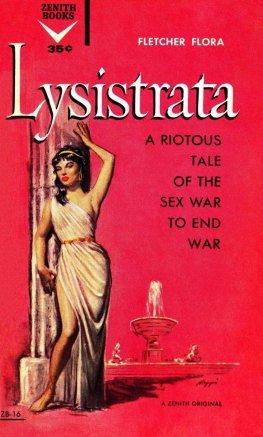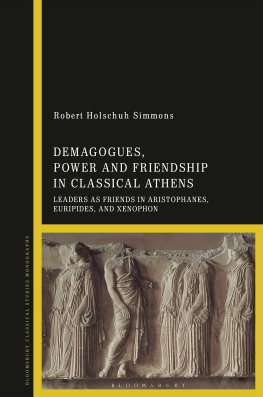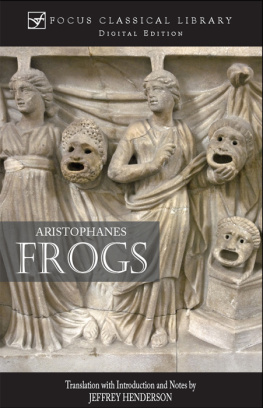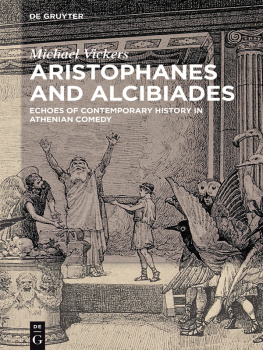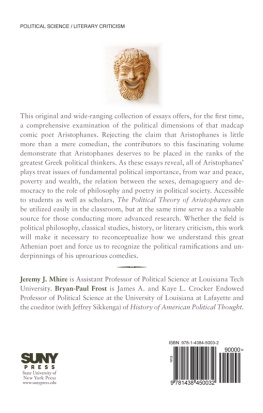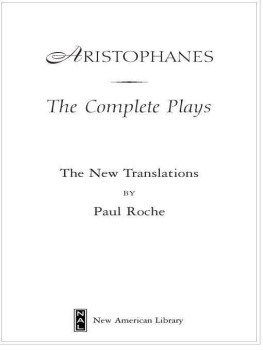
LYSISTRATA AND OTHER PLAYS
ARISTOPHANES was born, probably in Athens, c. 449 BC and died between 386 and 380 BC. Little is known about his life, but there is a portrait of him in Platos Symposium. He was twice threatened with prosecution in the 420s for his outspoken attacks on the prominent politician Cleon, but in 405 he was publicly honoured and crowned for promoting Athenian civic unity in The Frogs. Aristophanes had his first comedy produced when he was about twenty-one, and wrote forty plays in all. The eleven surviving plays of Aristophanes are published in the Penguin Classics series as The Birds and Other Plays, Lysistrata and Other Plays and The Wasps/The Poet and the Women/The Frogs.
ALAN H. SOMMERSTEIN has been Professor of Greek at the University of Nottingham since 1988, and is Director of Its Centre for Ancient Drama and its Reception. He has written or edited over twenty books on Ancient Greek language and literature, especially tragic and comic drama, including Aeschylean Tragedy (1996), Greek Drama and Dramatists (2002), and a complete edition of the comedies of Aristophanes with translation and commentary. For the Penguin Classics he has also translated Aristophanes The Knights, Peace, and Wealth in the volume The Birds and Other Plays.
ARISTOPHANES
Lysistrata and Other Plays
THE ACHARNIANS,
THE CLOUDS, LYSISTRATA
Translated with an Introduction and Notes by
ALAN H. SOMMERSTEIN
REVISED EDITION
PENGUIN BOOKS
PENGUIN BOOKS
Published by the Penguin Group
Penguin Books Ltd, 80 Strand, London WC2R 0RL, England
Penguin Putnam Inc., 375 Hudson Street, New York, New York 10014, USA
Penguin Books Australia Ltd, 250 Camberwell Road, Camberwell, Victoria 3124, Australia
Penguin Books Canada Ltd, 10 Alcorn Avenue, Toronto, Ontario, Canada M4V 3B2
Penguin Books India (P) Ltd, 11, Community Centre, Panchsheel Park, New Delhi 110 017, India
Penguin Books (NZ) Ltd, Cnr Rosedale and Airborne Roads, Albany, Auckland, New Zealand
Penguin Books (South Africa) (Pty) Ltd, 24 Sturdee Avenue, Rosebank 2196, South Africa
Penguin Books Ltd, Registered Offices: 80 Strand, London WC2R 0RL, England
www.penguin.com
Original translation first published 1973
This revised edition first published 2002
1
Copyright Alan H. Sommerstein, 2002
All rights reserved
The moral right of the translator has been asserted
Except in the United States of America, this book is sold subject to the condition that it shall not, by way of trade or otherwise, be lent, re-sold, hired out, or otherwise circulated without the publishers prior consent in any form of binding or cover other than that in which it is published and without a similar condition including this condition being imposed on the subsequent purchaser
9780141907017
Contents
THE ACHARNIANS
THE CLOUDS
LYSISTRATA
Chronology
(D) Produced at City Dionysia (March/April)
(L) Produced at Lenaea (January/February)
449/8 BC? Aristophanes born.
Euripides first victory at the City Dionysia.
Production of Euripides Telephus and Alcestis.
Outbreak of Peloponnesian War.
430426 The Great Plague of Athens.
430428 Aristophanes trains to be a dramatist, collaborating anonymously with other authors.
Death of Pericles.
Aristophanes submits The Banqueters to Archon for production, in the name of Callistratus.
The Banqueters (D): second prize.
The Babylonians (D): first prize.
Cleon attempts to prosecute Aristophanes for slandering the City.
The Acharnians (L): first prize.
PylosSphacteria campaign; Spartan invasions of Attica cease.
The Knights (L), the first play Aristophanes produced himself: first prize.
Cleon indicts Aristophanes for falsely pretending to be a citizen, but the prosecution is withdrawn.
The Clouds (D) proves a failure.
Truce of one year (begins day after City Dionysia).
The Preview and The Wasps (L): first and second prizes.
Truce expires; fighting resumed (in Thracian region only).
Cleon killed at Amphipolis (summer); peace negotiations follow.
Peace (D): second prize.
Peace of Nicias (takes effect twelve days after City Dionysia).
419/18 Aristophanes revises The Clouds, but the new version is not produced.
Sicilian expedition sets out.
The Birds (D): second prize.
Total destruction of Sicilian expedition.
Lysistrata (L?).
The Poet and the Women (Thesmophoriazusae) (D).
Oligarchic coup of Four Hundred, who rule for four months (summer).
Restoration of full democracy.
Death of Euripides.
Athenian victory at Arginusae; successful commanders tried and executed for failing to pick up shipwrecked men.
Death of Sophocles.
The Frogs (L): first prize.
Athenian fleet annihilated at Aegospotami (summer); Athens besieged.
405/4 Public honours awarded to Aristophanes, and The Frogs restaged (404, L).
Surrender of Athens. Installation of junta of Thirty.
Expulsion of Thirty. Restoration of democracy.
Trial and execution of Socrates.
Outbreak of Corinthian War (Athens/Thebes/Corinth/Argos vs. Sparta).
The Assemblywomen (Ecclesiazusae).
c. 390 Aristophanes chosen by lot to serve on the Council of Five Hundred.
Wealth (Plutus).
Cocalus (D), produced by Aristophanes son Araros: first prize.
386?Aeolosicon, produced by Araros: Aristophanes last play.
End of Corinthian War; Sparta retains her hegemonic position.
c. 385 Death of Aristophanes, leaving two sons, Araros and Philippus, who later become comic dramatists themselves.
384379 Plato makes Aristophanes a character in the Symposium.
Introduction
The eleven surviving plays of Aristophanes are all that we have, apart from fragments preserved on papyri or quoted by other ancient writers, of one of the most remarkable branches of the literature of antiquity, the Old Comedy of Athens. Of Old Comedy I will say more presently: first something on Aristophanes himself, his life, times, work and ideas.
ARISTOPHANES LIFE AND WORK
Aristophanes, son of Philippus, of the deme or district of Cydathenaeum within the urban area of Athens,Knights. This apparently resulted in another threat of prosecution by Cleon; Aristophanes (anonymous) ancient biographer says it was on the serious charge of falsely pretending to be an Athenian citizen, for which the penalty on conviction was sale into slavery. A rather obscure passage in The Wasps (lines 128491) suggests that Aristophanes saved himself (probably, once again, before the matter got as far as the courts) by promising to treat Cleon more mildly in future; if so, the promise was not kept.
Altogether in a career of some forty years Aristophanes wrote at least forty plays.undergo, before entering office, a scrutiny at which any dubious aspect of their past life might be brought up against them.
Next page

